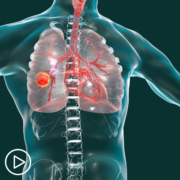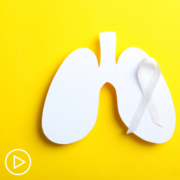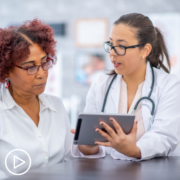Lung Cancer Care Decisions | Advice for Self-Advocacy
Lung Cancer Care Decisions | Advice for Self-Advocacy from Patient Empowerment Network on Vimeo.
Program Description: Should you see a lung cancer specialist? Dr. Erin Schenk shares advice for being proactive in your lung cancer care, the importance of speaking up and asking questions, and the benefit of seeking a second opinion with a specialist.
Dr. Erin Schenk is a medical oncologist, lung cancer researcher, and assistant professor in the division of medical oncology at the University of Colorado Anschutz Medical Center. Learn more about Dr. Schenk.
See More From INSIST! Lung Cancer
Related Resources:

Non-Small Cell Lung Cancer Essential Testing | What You Should Know |

|

Personalized Lung Cancer Treatment | Key Factors to Consider |
Transcript:
Katherine Banwell:
Because this program is part of our Insist series which empowers patients to insist on better care. Can you tell us why you think it’s important for patients to speak up and engage in their lung cancer care decisions?
Dr. Erin Schenk:
Absolutely, and I think as a physician it’s important not only to partner with patients but as well as their loved ones and their caregivers who help navigate this diagnosis of lung cancer. There are some diagnoses in the world, cancer being one of them and lung cancer especially that can turn everything upside down. So, it completely changes your world. Suddenly the life as you’ve been living it, the plans you had they all have to be paused or halted in some way to get care for the lung cancer diagnosis.
One of the – and one of the really hopeful parts about being a doctor who cares for patients with lung cancer is just the speed of the advancements and the speed of the changes in the treatment options that we have for patients diagnosed with really any type of lung cancer.
And so, I think it’s really important when you’re meeting with your team and you’re talking with your cancer doctor to really try to understand what is the information that they use to make some of these decisions or referrals on your behalf? And also, think about, is there an opportunity for me to get another opinion about what might be the best options?
Katherine Banwell:
When should patients consider a second opinion or even consulting a specialist?
Dr. Erin Schenk:
I think any time it’s appropriate. We – at our institution, we’re one of the main lung cancer centers that – you know, within several hundred miles, so we frequently see patients and sometimes it’s just to check in and say you know, the patient says, “Here’s what my team has started me on. You know, what do you think should be the next approach?” and we talk about that, but really anytime I think is appropriate for reaching out for another set of eyes to look at things. I would say perhaps some of those most critical times would be prior to treatment starts especially if – yeah, I would say prior to starting a treatment with that new diagnosis.
That would be a really critical time because often again, sometimes once we start down a treatment path, we’re in some ways we’re committed, but if that maybe isn’t the optimal treatment path based on, you know, the tumor and the biomarkers and the patient preference starting on that less optimal treatment path could potentially hurt patients in the long run. So, I would say at – you know, potentially at diagnosis when a treatment course is recommended and then if there is a need to change treatments.
So, for example, especially in the metastatic setting there are certain therapies widely available. People are very familiar with them, can start them no problem, but when those treatments stop being beneficial that might be a time to also meet with a specialist or go to a lung cancer center of excellence to get their opinions on what to do next.










